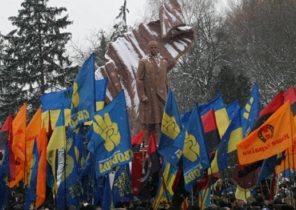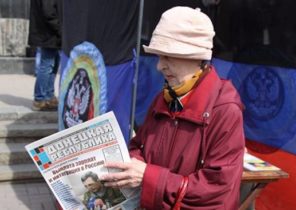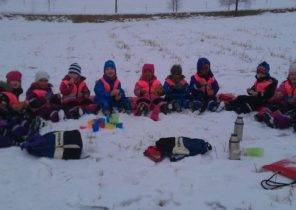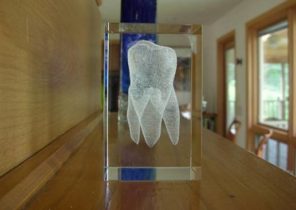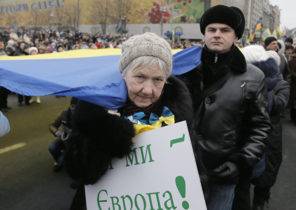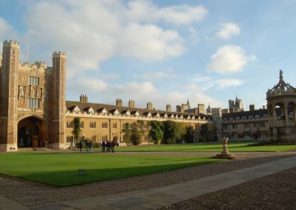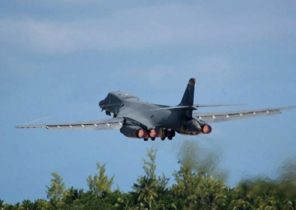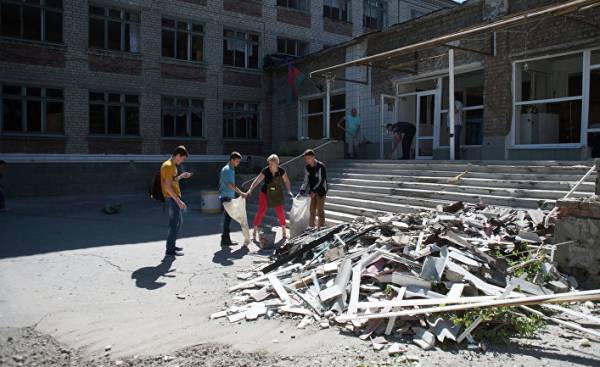
Almost three years of war in Eastern Ukraine had a negative impact on the educational potential of the region. Adaptation of educational process as the political situation, both sides are fighting for future students.
Military action in Eastern Ukraine began at the end of the 2013-2014 school year, almost before the final exams. Before universities, colleges, schools then had the task to issue diplomas and certificates to students. But in the summer the local opposition crossed the stage of hot war, and on the territories controlled by separatists held a referendum on the independence of the two breakaway republics — DNI and LC. These new political players for the most part copied the Ukrainian administrative system of the Executive power. So in both republics have appeared, among others, and their ministries of education.
While working on the article, I interviewed more than twenty students and teachers on both sides of the conflict. Many of the respondents point to the intolerance and mutual bitterness of the people in the conflict zone. A major obstacle to the normalization of the situation most think war, poverty, corruption and systematic degradation of social and humanitarian spheres, as well as the propaganda from both sides.
White crows
During the so-called “Russian spring” supporters of independence LNR and DND captured not only the administrative buildings and offices of the Ukrainian secret services and civilian agencies.
September 10, 2014, armed men appeared on the threshold of Donetsk national University (DonNU). The attack was led by the Pro-Russian political scientist Sergei Baryshnikov, who until 2013 worked as a Professor in the Department of political science of the faculty of history. A similar story happened with another major educational center: for the post of Vice-rector of Donbass state technical University (DonSTU), Alchevsk was appointed Mykola Boyko — the self-proclaimed mayor, one of the leaders of the local separatists.
Earlier, in July 2014, the state Treasury of Ukraine stopped the money transfer to the uncontrolled territory. Staff were left without wages, students without scholarships, and the universities themselves — with the budget deficit and debt. The government organized the relocation of teachers Donna in Vinnitsa, but some of the staff stayed in Donetsk.
The beginning of the academic year in the Donbas was postponed for a month, but the anti-terrorist operation (ATO), contrary to the campaign promise of President Poroshenko, to be completed in a short period of time failed. In November 2014, the national security Council of Ukraine (NSDC) adopted a decision to evacuate state institutions and banks. By this time, the division of universities has almost taken place. In schools the key posts were occupied by people loyal to the separatists, and in teaching teams was divided along ideological lines. Some employees supported the idea of independence of Donetsk and Lugansk regions from Ukraine, the other supported the territorial integrity of the country.
“My husband and I survived this persecution. We were the outsiders, when he supported the independence we have in Donetsk. At work, showered with death threats. We took the necessary things, books, documents, I took the flag of Ukraine. At night we went to Dnipropetrovsk. Since then I have not returned to Donetsk, but the husband several times to see parents,” says Irina, a teacher of English.
She worked in one of Donetsk universities, and in the summer of 2014 left the city due to threats from Pro-Russian colleagues and asked not to specify his name, as it still fears prosecution. Now Irina teaches English language courses, the University does not want to work — a small salary would not allow the family to rent housing.
Difficulty moving
“Often it was touching history when people risked their lives to take out the flag of the University. The teachers themselves or the students came from the combat zone, with nothing but what they came out of the house, — talks about moving universities Serhiy Kvit, who held the post of Minister of education and science of Ukraine from February 2014 to April 2016. Later was created the Council of rectors of universities evacuated. We started to work with international foundations and organizations to connect educational institutions to the international educational projects”.
According to Kvit, for universities, was developed a General algorithm for moving from uncontrolled territories. The Ministry did not give the order to evacuate until the moment in University have not appeared, the initiative group of teachers, students and employees of the administration who took responsibility to carry out the move. The universities have taken their own campuses or agreed with the local authorities on the allocation of the room. So, Donna is located in the former administrative building of the plant “Crystal”.
On the territory of the breakaway republics remains significant funds and equipment. “We do not give from the University, even our intellectual property. That someone stayed at home on the computer we took with them,” — says Svetlana marova, acting rector moved the Donetsk state University of management.
According to the rector of the Donetsk law Institute Alexey Mazuski, the move was a new test for employees. It was necessary to decide whether people are ready to travel far away, leaving family and familiar surroundings. “Not all were able to survive, but those who are left, become one team. The team is the only thing that we’ve taken out,” says the rector.
Just moved 16 universities and 10 institutes, and only two of them — in Kiev, Lugansk state Academy of culture and arts and Taurida national University. Vernadsky, which was located in the Crimea. Other universities located in Krivoy Rog, Kramatorsk, Severodonetsk, Kharkiv and other cities.
Each institution had the financing, but to get access to the money, it was necessary to renew documents, staffing, resume Treasury services. We are talking about money, despite the restriction of access to the accounts from the uncontrolled territories, transferred to the accounts of universities. Only after registration outside the territory of LNR and DNR accounting moved universities had the opportunity to use these funds.
Reports from teachers evacuated universities, the salary they received on time and the debts were paid within a month. However, in 2015 due to bureaucratic delays, staff moved from Donetsk to Pokrovsk Donetsk national technical University (DonNTU), back pay for six months. It concerned, first and foremost, educational support personnel — laboratory technicians, supervisors and secretaries.
To attract young people
Problems with the transfer of students from other regions, according to Kvit, have arisen — they have taken over the established norm: “throughout the semester until the end of 2014, they could decide to stay to learn more or to transfer to their home evacuated universities”. In November 2014, the Minister of education reported that about 5.5 thousand students have chosen to study in Ukraine. In 2016, according to educational portal that brings together. ua, these students became about 40 000 people. With them on the territory controlled by Ukraine went 3.4 thousand teachers of higher schools.
The people’s Deputy of Ukraine Oleksiy Ryabchin, associate Professor Donna, became one of the initiators of the Council of rectors of universities of displaced co-worked on the draft laws concerning the development of universities. As a result of more thousands of high school graduates have done without the all-Ukrainian final exam. According to Ryabchin, students from the LC and the DNI are required to facilitate access to higher education: “the State should continue to support these universities and research institutions, as they retain scientific and educational potential of the Ukrainian Donbass”.
17 November, 2015 accreditation Commission of the Ministry of education of Ukraine (MOU) has revoked the licences of the universities that appeared on the uncontrolled territory of Luhansk and Donetsk regions and Crimea. February 1, 2017, the fate of the colleges, technical schools and colleges. The list of 67 professional education institutions, students where given the opportunity to gain Ukrainian education. For this purpose the Ministry has developed a procedure for certification and qualification of the student for further study in Ukraine.
To obtain a school diploma grade 9 and 11 graduates of the LC and the DNI need to be fixed in the base school. Such an institution could be as an educational center external studies, so any school that has the equipment for distance learning and Internet access. Several times a year, the student must attend this school.
First students up for the items needed to pass the national exam (EIT), and also learn what is not in the school program, the DNI and the LC, for example, the history of Ukraine. Graduates from the self-proclaimed republics can be certified in Ukrainian universities, and students with uncontrolled territories — translated into Ukrainian. The students may be credited with the latest information about their education. For example, if in 2014 the student has completed the third course to continue studying in Ukraine, it will on the fourth, even if studied at one of the universities for the LPR and DPR.
Thus, the Ukrainian Ministry gives you the opportunity to obtain the document on education, but only if they pass the required examinations on the territory controlled by the Ukrainian authorities. The recognition of diplomas of the LC and the DNI question.
In the direction of Russia
In Donetsk on Ukraine’s decision to deprive the universities of licenses responded sarcastically. The Minister of education DND Larisa Polyakova explained these actions by “the desire to win for their own failures in education”. Polyakova said that “the Republic has its own accreditation Commission and the state”, and for educators DNR decision MOU is not a document.
In itself, the unrecognized Republic, according to data provided by the office of the DNI, 74 trained thousands of students, with 25% of the governmental order of budget places is a specialty of civil protection and fire safety.
The Ministry of education LNR and DNR started to achieve recognition of the national diplomas and certificates in Russia and at the same time to facilitate graduates in obtaining documents in Russian universities. In July 2015, the Minister of education and science Dmitry Livanov said that the documents on education with the seal of the unrecognized republics, the Ukrainian equivalent as in a legal sense, by level of education. Mostly such students take in universities of the Russian regions bordering with the unrecognized republics — the Rostov, Voronezh and Belgorod regions.
There are known cases when the staff of the universities of the unrecognized republics have agreed on the protection of diplomas in Russian universities. For example, in 2015, several dozen students of DonSTU managed to get a master’s degree Lipetsk State University on a speciality “Metallurgical engineering”. In 2016, the Ministry of education announced three thousands of Russian diplomas received by students of the DNI.
However, for the residents of the DNI and the LC is the choice of school often due to political sympathies and ideas about the future of the region. In the nearly three years of war and its attendant propaganda, more and more people on the uncontrolled territory plan my life based on the realities of wartime. Sometimes the economic crisis leaves no choice to people, because the main source of money, except service in the armed forces is to earn money in Russia.
In the direction of Russia drifts and education in the LC and the DNI. But if some graduates of the national universities receive Russian diplomas, studying in parallel to the external, further work in Ukraine with such credentials it is impossible.
Education without choice
Svetlana lives in separatist-controlled Horlivka and studying at the Donetsk national University of the DNI. According to the girl, her parents can’t afford to send her daughter away, and Donetsk very close: “I hope that by the time I finished school, the war will end, and my diploma will be worth something. I know that half of the students and teachers left, but the scientific basis remains in place, and hence a real University here, not in the winery”.
A classmate of Svetlana Christina is not going to leave the NPT — it is the patriot of the unrecognized Republic, and the story of its formation begins with a set of propaganda clichés, the junta, punitive, dill. Christina, like her parents, believes in the future of the NPT, and called Ukraine “the former Ukraine”. According to the girl, in the Republic there is no indoctrination in schools nor in universities, and regular Patriotic events with the participation of the separatists only benefit.
However, the militarization of education exists on both sides of the front. In Ukraine on a visit to pupils and students come to the veterans of the ATO, Ukrainian troops involved in the clashes in the Donbass. So, in February at the Kyiv school N182, a meeting was held with the soldiers of the battalion “Azov”, which in 2013-2014 was defended by the Maidan.
Outside of the school system volunteer battalions are also engaged in Patriotic education. They organize summer camps and military training for children from 9 to 18 years. Demobilized soldiers of the regiment “Azov” for three consecutive years, every summer, classes in unarmed and knife combat and lectures on the “ideology of Ukrainian nationalism” in the children’s summer camp “Azov”. The camp is forbidden to use appliances, and mobile phones young “Azov” get only 20 minutes a day to call my parents. The work with children carried out by other nationalist organizations.
Opening of military-Patriotic camp Azovets in Kiev. Source: azov. press. EN. The Director of the Donetsk Institute of information Vitaly Sizov link this practice with Patriotic education in the Soviet educational tradition. “The Soviet era the most clear people who find themselves on opposite sides of the front line, so a meeting with participants of hostilities — it is identical in form events. On both sides of the front line the authorities are trying to consolidate the symbolic space,” he says. According to Sizov, parenting in two “multi-vector ideological worlds” can lead to conflict in the future, but it is difficult to assess whether this effect is a real effect.
According to political analyst Mykhailo Minakov, the conflict already exists, as the war becomes a kind of norm for young people. “The school initiative, in my opinion, patriotism is seen as a military practice in which enemies are the Russians and Russian-speaking Ukrainians. And the soldiers of the atoms as the source of correct attitudes: patriotism and dedication” — says Minakov.
Most of the students from the ATO are often forced to travel between home and place of study, crossing the front line. In addition to the cost of food and accommodation, which are borne by the parents of such students no support- they are in this foreign environment, and their opportunities on the labour market is limited by unemployment.
Fight for the brand
During the war between teachers who remained in the breakaway republics and those who are left uncontrolled territory, there was not a hint of scientific cooperation.
This, however, does not negate the simple communication between former colleagues. Those who work in the evacuated universities, occasionally come home. Employees of the educational system of the republics, in turn, sometimes I visit Ukraine for registration of a pension or documents as passport of the unrecognized republics have no legal force. Lately to make it complicated — the Ukrainian government has established a system of permits governing the crossing of the demarcation line. The authorities DND and LNR also introduced rules for visiting of territories under their control, which significantly restrict the freedom of movement of residents of Eastern Ukraine.
Michael teaches evacuated from Lugansk to Severodonetsk University and several times a month to check in on parents who remained on the uncontrolled territory of Kiev. He maintains relationships with colleagues who remained in LC. “Life everywhere, not sugar. I originally did not support any of the parties to the conflict, but work on the power that is now in Lugansk, I can’t. Moreover, you do not want to deceive students — diplomas of the LC has never will be recognized as the Republic itself. Shattered established scientific tradition school”.
Michael is sure to get a quality education either in Ukraine or in Russia, and the staffing level in the remaining high school is not enough: the effect of such training is equal to the effect of self-education.
While both sides are fighting for future students. Displaced from the area ATO Ukrainian Ministry provides targeted support in the form of full or partial payment of tuition fees, social grants and concessional long-term loans to education. In addition, students-free settlers live in hostels and receive textbooks.
The relevant departments of the unrecognized republics attract the students of Russian diplomas, although in their favour the war. To avoid the risks associated with moving across the front line and the difficulties of living away from home, many residents of the LNR and DNR choose to study in local universities.
The effect of training in Lugansk equal to the effect of self-education
However, Ukrainians are richer leaving to study abroad in Europe. Most often students choose Poland, Czech Republic and the country
In the Baltic States. Rector of Kiev national University. Shevchenko (KNU) Vladimir Bugrov claims that Polish universities in 2014 have lowered the cost of learning that attracted many Ukrainians: “In Poland will have to spend money to stay, and it will be about the same as a student will spend on education in Ukraine”.
Local Ukrainian universities evacuated universities and institutions have become natural rivals for the applicant. Given the demographic decline, low results of external independent estimation and decrease in solvency of Ukrainians, the competition is getting even tougher.
However, the education Ministry has no plans to merge evacuated with local universities. On November 25, President Poroshenko signed the law No. 4718, which established the procedure of activities of the universities, moved from the uncontrolled territories. These universities retain their status within the next five years and will not be accredited until the end of the ATO. Moreover, it introduced a temporary moratorium on the execution of credit obligations of such institutions. Against the law to charge penalties and interest for any debt of those universities.
Such loyalty to evacuated universities due to the political reasons. In the case of absorption of Donbas displaced universities, local educational agencies, the separatists would have grounds to argue that remaining in the territory under their control universities — the only one who can claim the brand.
Despite the openness of the education system of Ukraine for the residents of uncontrolled territories, war and economic crisis in the region creates inevitable problems in the educational sphere. Split the front line, people often do not plan far your life and career. On the other hand, Russian or Ukrainian diploma is becoming the choice of future place of residence, at least until the conflict is resolved. The inevitable result of the war, the impoverishment of the citizens prevents them from receiving quality basic education for parents of schoolchildren and students from the self-proclaimed republics moving children to College is associated with significant costs. Therefore, an investment in the future of their children becomes as remote as peace in the East of Ukraine.

